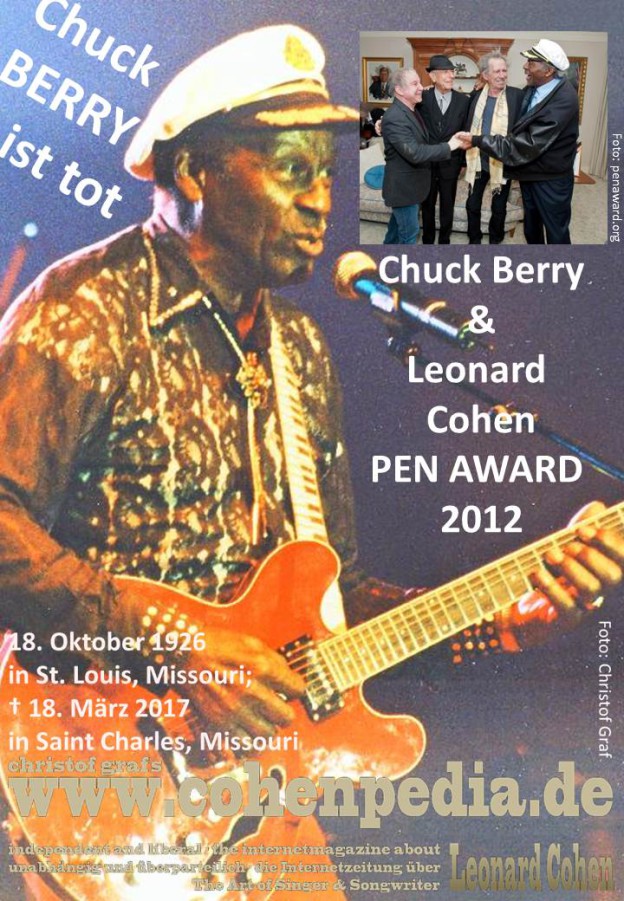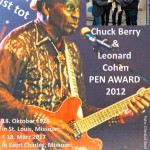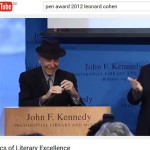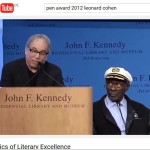https://www.youtube.com/watch?v=vhfDAplS38U
–> Berry, Chuckà Charles Edward Anderson „Chuck“ Berry, 1926 in St. Louis, Missouri geboren, US-amerikanischer Sänger, Gitarrist, Komponist, gilt als ein Pionier des Rock ʼnʼ Roll. 2012 erhielt er zusammen mit Leonard Cohen den à PEN Award. Überraschungsgast war à Keith Richards
–> PEN AWARD. 2012 erhielt Cohen den PEN AWARD. Bono, Rosanne Cash, Elvis Costello, Bill Flanagan, Paul Muldoon, Smokey Robinson, Salman Rushdie und Paul Simon waren zugegen, als Leonard Cohen zusammen mit Chuck Berry geehrt wurde. Salman Rushdie hielt die Laudatio auf Cohen, und Überraschungsgast und Mitbegründer der Rolling Stones, Keith Richards, sprach über Chuck Berry. Aber auch Bob Dylan meldete sich trotz Abwesenheit zu Wort. In einer E-Mail, die von Bill Flanagan verlesen wurde, nannte Bob Dylan Berry „the Shakespeare of rock & roll“ und Cohen „the Kafka of the blues“. Cohen konterte bei seiner Acceptance Speech später dass er im Vergleich zu Berrys „Roll Over Beethoven“ nur im Sinne von Walt Whitmans joyful noise ein bisschen „barbaric yawp“ fabriziere. „If Beethoven hadnʼt rolled over“, he said, „thereʼd be no room for any of us.“
Salman Rushdie zitierte vor seiner Laudatio einige Zeilen von „Bird On A Wire“ und meinte nur: „Put simply, if I could write like that, I would.“ Dann folgte die eigentliche Laudatio von Salman Rushdie:
„Well this is a gig I wouldnʼt have missed for the world, I have to say. We were all having our picture taken backstage and I thought, this is the best photograph I have ever been in, and Iʼve been in one or two. I really have to say Iʼm really grateful to PEN New England for the initiative of doing this, and to everybody who made it happen. When I was telling my friends that I was going to come and have the privilege of giving an award to Leonard Cohen, they began to insist that I did certain things. All of these friends were women. One of them said I should kiss him for her. Havenʼt done that yet, Leonard. Another of my friends said, ‚You know, I live on Clinton Street, and Iʼd really like him to come make music for me all through the evening, and Iʼll even wear a blue raincoat.‘ This is a sign of how much regard and how deeply these songs have entered peoples lives. Yesterday, just as an experiment, I put on my twitter feed. I asked people what was their favorite Leonard Cohen line, and hundreds of people replied with an enormous diversity of lines from this extraordinary songbook. Several of them were among my favorites, but it was just both, the breadth of the response, how much different work was being responded to, how passionately it was being responded to, how much it meant to how many people. It was really very telling. Iʼve been listening to Leonard Cohenʼs music ever since I was an undergraduate at Cambridge (the other Cambridge; the old one). Itʼs really a thrilling opportunity to have a chance to tell him how much that music has meant to me for over four decades. I said to him before we came on that when we were kids he taught us something about how it might be to be grown up. How to have relationships that were in the real world, that were not kid stuff, but had the pain, the difficulty, the complexity, and the exaltation of real relationships to the real world of adult life.
Listening to his lyrics again before this evening, I was struck by something I had forgotten perhaps about how much religious imagery there is to be found in them. Jesus crops up in ‚Suzanne‘ and there are the ‚Sisters of Mercy‘ and of course there is the great Hallelujah. There has always been something anthemic, something hymn-like about Leonard Cohenʼs greatest songs, though when you start listening closely, you here his wit and his jaundice comedy and sometimes his disillusion undermining those hymnal qualities. Not many hymns would rhyme Hallelujah with whatʼs it to ya. Not to mention all the other rhymes in that which are equally non-sacred. I think itʼs true that all great literature begins at the level of the line. If you canʼt write a good line, you canʼt write a good paragraph, you canʼt write a good page, you canʼt write a good book. At the level of the line for all these years, Leonard Cohenʼs work has been amazing us again and again. This is work of great beauty and depth, and to put it simply, if I could write like that, I would. I think of poets in the twentieth century who have had a real relationship with meter and rhyme, and who have loved the playfulness of those things, and I think of W. H. Auden and James Fenton, and I think that the kind of playfulness of those rhymes in Hallelujah, for example, is something that an Auden or a Fenton would respond to very immediately because itʼs the kind of language play that you find in their poetry, but there is only one man who writes like this, exploring melancholy and exhaultation, desire and loss, as nobody else can, and so it is with great respect and admiration I am able to present this award. Now itʼs my great pleasure to present the 2012 PEN Award for Song Lyrics of Literary Excellence to Mr. Leonard Cohen.“
Fotos: CHristof Graf (Chuck Berry), mit frdl. Unterstützung von www.pen.org




